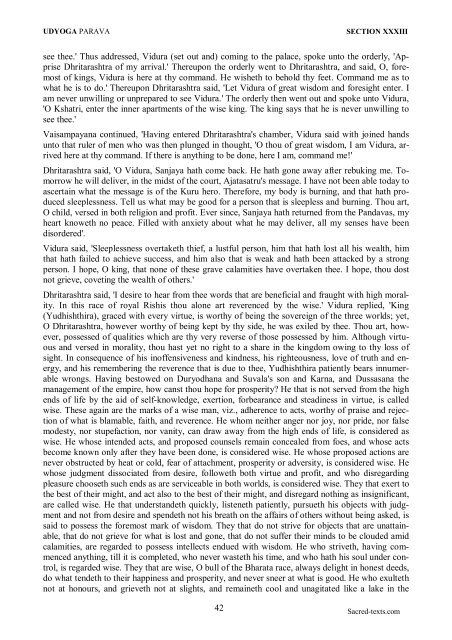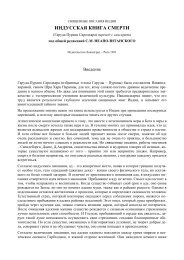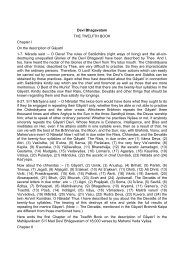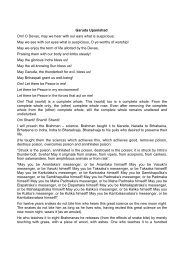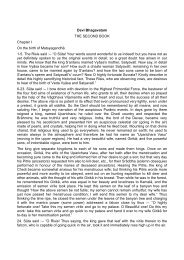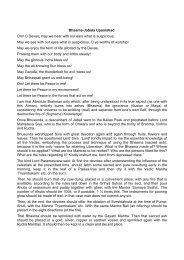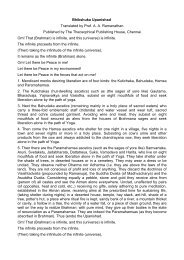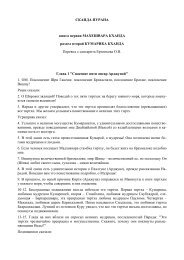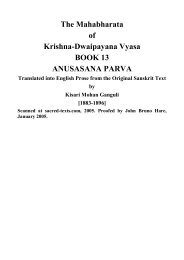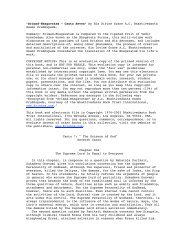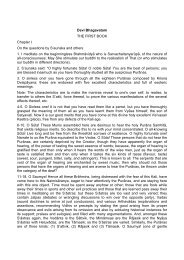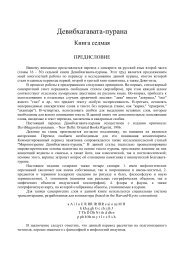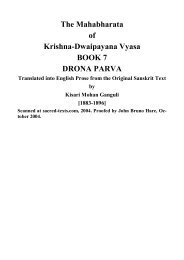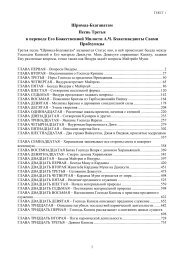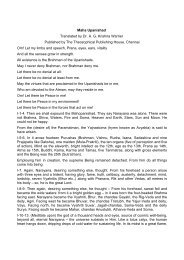Mahabharata 05 (eng)..
Mahabharata 05 (eng)..
Mahabharata 05 (eng)..
You also want an ePaper? Increase the reach of your titles
YUMPU automatically turns print PDFs into web optimized ePapers that Google loves.
UDYOGA PARAVA<br />
SECTION XXXIII<br />
see thee.' Thus addressed, Vidura (set out and) coming to the palace, spoke unto the orderly, 'Apprise<br />
Dhritarashtra of my arrival.' Thereupon the orderly went to Dhritarashtra, and said, O, foremost<br />
of kings, Vidura is here at thy command. He wisheth to behold thy feet. Command me as to<br />
what he is to do.' Thereupon Dhritarashtra said, 'Let Vidura of great wisdom and foresight enter. I<br />
am never unwilling or unprepared to see Vidura.' The orderly then went out and spoke unto Vidura,<br />
'O Kshatri, enter the inner apartments of the wise king. The king says that he is never unwilling to<br />
see thee.'<br />
Vaisampayana continued, 'Having entered Dhritarashtra's chamber, Vidura said with joined hands<br />
unto that ruler of men who was then plunged in thought, 'O thou of great wisdom, I am Vidura, arrived<br />
here at thy command. If there is anything to be done, here I am, command me!'<br />
Dhritarashtra said, 'O Vidura, Sanjaya hath come back. He hath gone away after rebuking me. Tomorrow<br />
he will deliver, in the midst of the court, Ajatasatru's message. I have not been able today to<br />
ascertain what the message is of the Kuru hero. Therefore, my body is burning, and that hath produced<br />
sleeplessness. Tell us what may be good for a person that is sleepless and burning. Thou art,<br />
O child, versed in both religion and profit. Ever since, Sanjaya hath returned from the Pandavas, my<br />
heart knoweth no peace. Filled with anxiety about what he may deliver, all my senses have been<br />
disordered'.<br />
Vidura said, 'Sleeplessness overtaketh thief, a lustful person, him that hath lost all his wealth, him<br />
that hath failed to achieve success, and him also that is weak and hath been attacked by a strong<br />
person. I hope, O king, that none of these grave calamities have overtaken thee. I hope, thou dost<br />
not grieve, coveting the wealth of others.'<br />
Dhritarashtra said, 'I desire to hear from thee words that are beneficial and fraught with high morality.<br />
In this race of royal Rishis thou alone art reverenced by the wise.' Vidura replied, 'King<br />
(Yudhishthira), graced with every virtue, is worthy of being the sovereign of the three worlds; yet,<br />
O Dhritarashtra, however worthy of being kept by thy side, he was exiled by thee. Thou art, however,<br />
possessed of qualities which are thy very reverse of those possessed by him. Although virtuous<br />
and versed in morality, thou hast yet no right to a share in the kingdom owing to thy loss of<br />
sight. In consequence of his inoffensiveness and kindness, his righteousness, love of truth and energy,<br />
and his remembering the reverence that is due to thee, Yudhishthira patiently bears innumerable<br />
wrongs. Having bestowed on Duryodhana and Suvala's son and Karna, and Dussasana the<br />
management of the empire, how canst thou hope for prosperity? He that is not served from the high<br />
ends of life by the aid of self-knowledge, exertion, forbearance and steadiness in virtue, is called<br />
wise. These again are the marks of a wise man, viz., adherence to acts, worthy of praise and rejection<br />
of what is blamable, faith, and reverence. He whom neither anger nor joy, nor pride, nor false<br />
modesty, nor stupefaction, nor vanity, can draw away from the high ends of life, is considered as<br />
wise. He whose intended acts, and proposed counsels remain concealed from foes, and whose acts<br />
become known only after they have been done, is considered wise. He whose proposed actions are<br />
never obstructed by heat or cold, fear of attachment, prosperity or adversity, is considered wise. He<br />
whose judgment dissociated from desire, followeth both virtue and profit, and who disregarding<br />
pleasure chooseth such ends as are serviceable in both worlds, is considered wise. They that exert to<br />
the best of their might, and act also to the best of their might, and disregard nothing as insignificant,<br />
are called wise. He that understandeth quickly, listeneth patiently, pursueth his objects with judgment<br />
and not from desire and spendeth not his breath on the affairs of others without being asked, is<br />
said to possess the foremost mark of wisdom. They that do not strive for objects that are unattainable,<br />
that do not grieve for what is lost and gone, that do not suffer their minds to be clouded amid<br />
calamities, are regarded to possess intellects endued with wisdom. He who striveth, having commenced<br />
anything, till it is completed, who never wasteth his time, and who hath his soul under control,<br />
is regarded wise. They that are wise, O bull of the Bharata race, always delight in honest deeds,<br />
do what tendeth to their happiness and prosperity, and never sneer at what is good. He who exulteth<br />
not at honours, and grieveth not at slights, and remaineth cool and unagitated like a lake in the<br />
42 Sacred-texts.com


